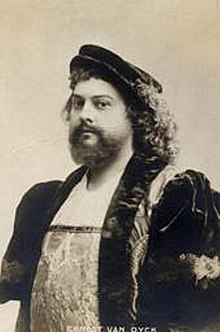Ernest van Dyck
Ernest Marie Hubert van Dyck ( April 2, 1861 in Antwerp - August 31, 1923 in Berlaar ), also Ernest Marie Hubert van Dijck , was a Belgian journalist , author and opera singer ( tenor ).
Life
Van Dyck, the son of a wealthy factory owner, attended French school in his hometown. Since he was supposed to become a notary, he first studied at the Universities of Leuven and Brussels. In 1883 he went to Paris, where he worked as a journalist.
There you discovered his tenor voice, which he and his friends had taken for a baritone. Dyck now paid more attention to his voice, but without a thought of a career as a singer. He now took singing lessons, but continued to work as a journalist for a Catholic-Conservative paper in Limburg and then for the Bonapartist paper La patrie in Paris.
By chance he became an opera singer: the tenor in question who had to sing the main role fell ill in June 1883, occasionally when the cantata Le gladiateur by Jules Massenet (composed for the Prix de Rome ) was performed. And then van Dyck took over, persuaded by Massenet himself to learn the game overnight. The performance was a complete success.
This prompted Charles Lamoureux to hire him immediately for his concerts, in which he participated in an outstanding manner from 1883 to 1887.
In the meantime, his enthusiasm for Richard Wagner's works grew and he studied the most important parts from his works, which he then sang fragmentarily at the Lamoureux concerts until he finally sang the leading role in the memorable first Lohengrin performance in Paris on May 3, 1887 . A year later he sang “Parzival” at the Bayreuth Festival .
After that, both the Hamburg and Vienna operas tried to get him. Vienna won the race, and after he had learned the German language in Karlsruhe and had rehearsed some Wagner operas with Hofkapellmeister Felix Mottl , he appeared in November 1888 as “Lohengrin” to the Viennese.
Even if he became known through Wagner's interpretations, he was rather popular in Vienna as “Chevalier des Grieux” in Manon von Massenet and later as “Werther”. Above all, however, it was his “Canio” in Bajazzo that was his star role in Vienna.
In 1898 Dyck left Vienna as an imperial Austrian chamber singer and went to New York, where he was in the ensemble of the Metropolitan Opera until 1902 . Here he sang “Lohengrin” 24 times, “Tannhäuser” 23 times, “Tristan” 10 times and “Siegmund” 40 times.
In 1902 he was in Moscow as "Siegmund", in 1909 in Budapest as "Tristan" and as "Siegfried".
From 1906 he held professorships at the conservatories in Brussels and Antwerp. He was the founder of the Nouveaux Concerts in Antwerp.
In 1886 he married Augusta Servais and became brother-in-law of the Belgian composer and conductor Franz Servais (1846–1901). From this marriage came his daughter Isolde van Dyck (born in Bayreuth in 1889), who also became a singer.
Dyck was also active as a writer and wrote several texts on ballets and vaudevilles, of which the comic ballet, the glockenspiel , music by Massenet, are particularly noteworthy.
gallery
Ernest van Dyck and Amalia Materna as "Parsifal" and "Kundry" in Bayreuth 1889.
Van Dyck as Lohengrin , 1895
literature
- Ludwig Eisenberg : Ernest van Dyck . In: Large biographical lexicon of the German stage in the XIX. Century. Paul List, Leipzig 1903, p. 218 ( daten.digitale-sammlungen.de ).
- Barbara Boisits: Dyck, Ernest van (own Ernest-Marie-Hubert). In: Oesterreichisches Musiklexikon . Online edition, Vienna 2002 ff., ISBN 3-7001-3077-5 ; Print edition: Volume 1, Verlag der Österreichischen Akademie der Wissenschaften, Vienna 2002, ISBN 3-7001-3043-0 .
- Franz Hadamowsky, Alexander Witeschnik: Hundred Years of Vienna Opera on the Ring [anniversary exhibition] . Vienna, Action Committee 100 Years Celebration of the Vienna State Opera 1969, p. 84
Web links
- Ernest van Dyck in the Bavarian Musicians' Lexicon Online (BMLO)
- Ernest van Dyck at Operissimo on the basis of the Great Singer Lexicon
- Ernest van Dyck in the Vienna History Wiki of the City of Vienna
- Ernest van Dyck at isoldes-liebestod.net
- Ernest van Dyck's appearances at the Vienna State Opera
| personal data | |
|---|---|
| SURNAME | Van Dyck, Ernest |
| ALTERNATIVE NAMES | Van Dyck, Ernest Marie Hubert (full name); Van Dijck, Ernest Marie Hubert |
| BRIEF DESCRIPTION | Belgian journalist, author and opera singer (tenor) |
| DATE OF BIRTH | April 2, 1861 |
| PLACE OF BIRTH | Antwerp |
| DATE OF DEATH | August 31, 1923 |
| Place of death | Berlaar |



